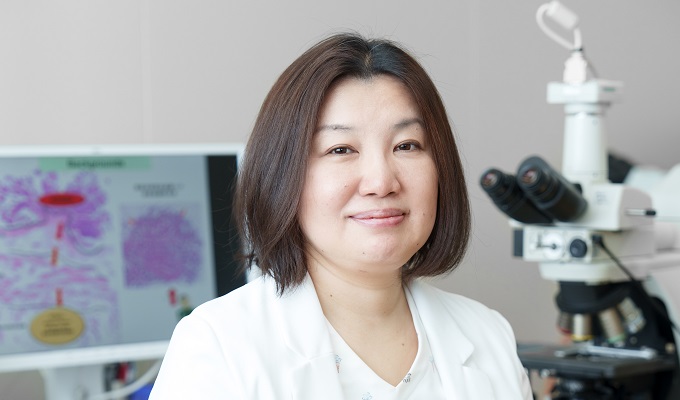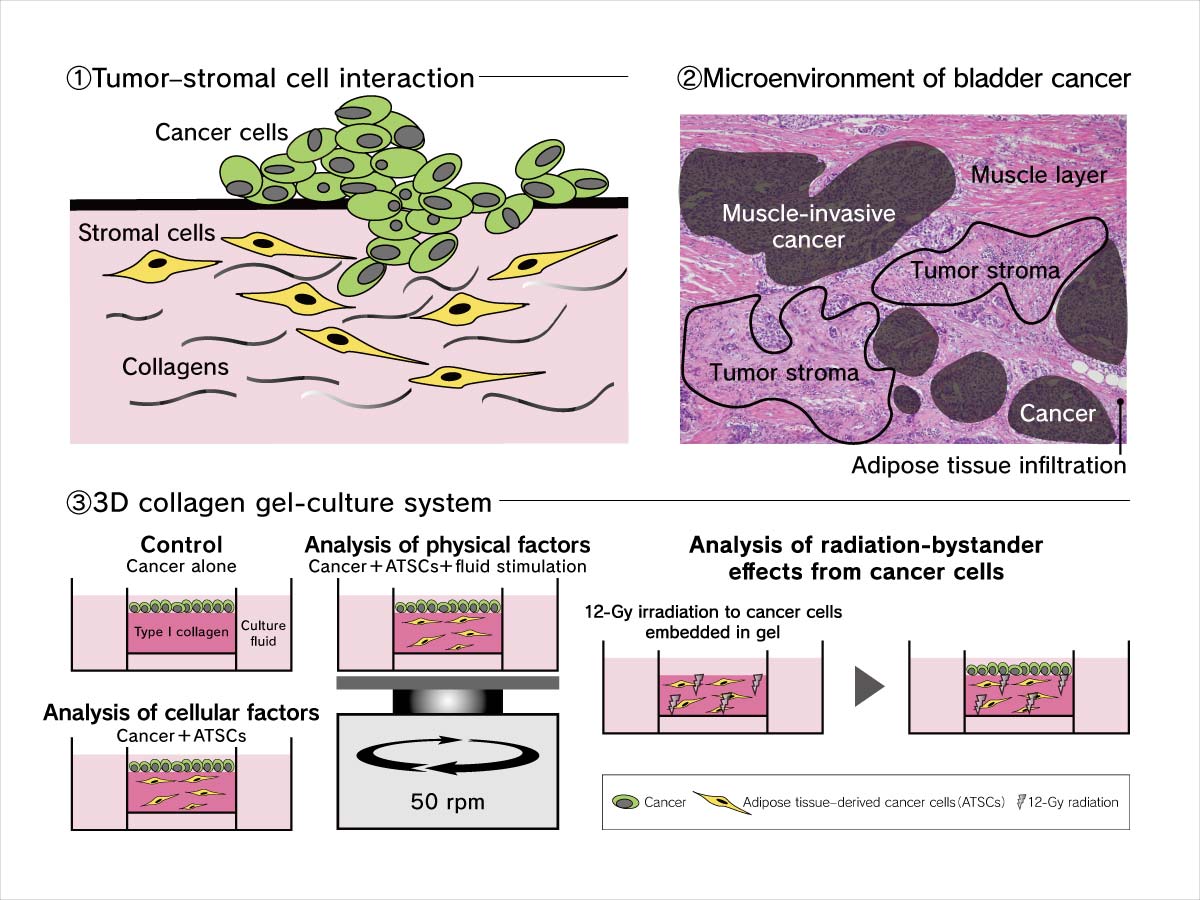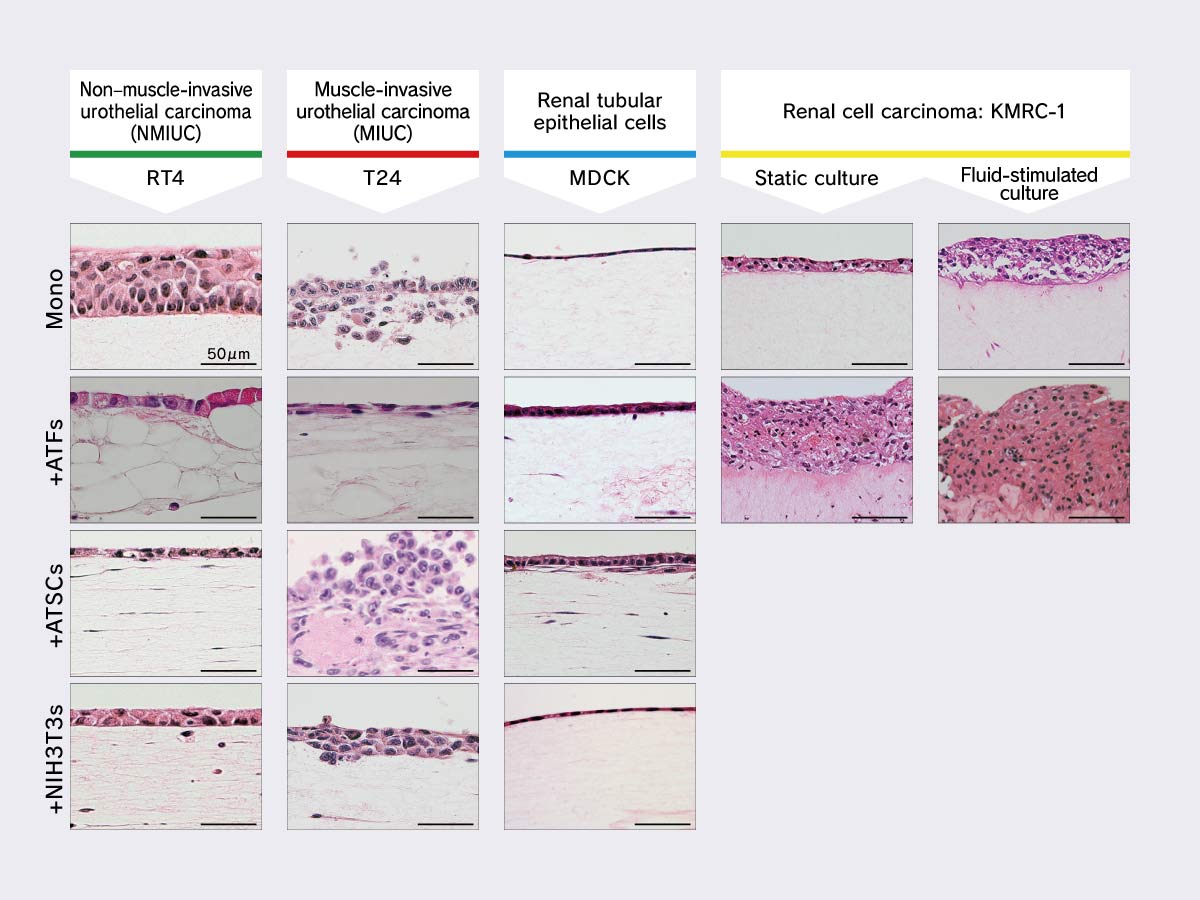Study on the impact of the tumor stromal microenvironment
on cancer cell kinetics
Research Fields
Urological cancers, adipose tissue, tumor microenvironment, urinary function, pelvic organ prolapse
Keywords
Tumor microenvironment, mesenchymal stem cells, 3D collagen gel culture
Research overview
Understanding the biological functions of adipose tissue to explore new medical technologies Research on the impact of adipose tissue on cancer
Bladder cancer may be invasive or non-invasive. Whereas the former type of bladder cancer spreads into the surrounding organs, the latter does not, and instead recurs inside the bladder. What makes bladder cancer behave in such different ways? To shed light on this question, we focus on adipose tissue, which is believed to have a large biological impact on cancer cells, and stromal cells in adipose tissue in our research.
■ Utilizing a 3D collagen culture system specially developed in the lab
Adipose tissue plays a central role in the development of metabolic syndrome. Recent studies have reported an association between metabolic syndrome and cancer, while adipose tissue has been shown to supply special cells that are essential for the survival of cancer cells. Focusing on adipose tissue, which is found in abundance around the kidney and bladder, we have been studying its interaction with kidney tubule cells as well as renal, urothelial, and prostate cancers.
A special three-dimensional collagen gel culture system, which we developed at our lab, plays an important role in our lab. This system allows us to use a simple method that makes it easy for us to use cancer drugs or targeted molecular therapies on cultured cancer tissues or expose them to radiation, which is difficult with traditional methods. When we have the results, we can perform a variety of medical analyses, such as changes in the tissue morphology.
Going forward, we are hoping to move our research further by working with research institutions that specialize in protein or gene analysis, so that it will help us explore new therapeutic targets for cancer.
■ Potential of adipose tissue
The possibilities are endless for the medical applications of adipose tissue-based technologies. The stromal cells derived from adipose tissue are highly capable of differentiation and have the potential to be applied to a number of fields from cancer treatment to regenerative medicine.
We are currently exploring the ways to use adipose tissue not only for the development of targeted molecular therapies for cancer, but for regenerative medicine for conditions, such as urinary incontinence/pelvic organ prolapse that are caused by a weakened pelvic floor muscle or supporting tissues (in women), and urinary incontinence that occurs after prostate surgery (in men).
I like my lab at Saga University because it is where I can work on topics that I am interested in. Even though it is rare for us to see the results of our work quickly, being able to face a question or interest that we have face-on keeps us motivated to continue our work through life events, such as marriage, childbirth, and caregiving. Even if you are not completing your work as a researcher, there will always be others to help you with it. The fact that we are in a position to collaborate with research institutions or businesses to move our research forward and eventually applying it to real life use is what gives us an advantage.
Message
Adipose tissue has endless possibilities. The stromal cells derived from adipose tissue are multipotent, and have the potential to be applied to a number of fields from cancer treatment to regenerative medicine. We strive to do research that brings basic research to clinical practice.
Join us in our journey into the deep and profound world of fat.
Main publications
- Udo K, Aoki S, Uchihashi K, Kawasaki M, Matsunobu A, Tokuda Y, Ootani A, Toda S, Uozumi J. Adipose tissue explants and MDCK cells reciprocally regulate their morphogenesis in coculture Kidney Int 78: 60-68, 2010
- Maki Kawasaki-Nanri et al.:Differential effects of adipose tissue stromal cells on the apoptosis,growth and invasion of bladder urothelial carcinoma between the superficial and invasive types. International Journal of Urology (2016) 23, 510-519
- Udo K, Nanri M, Tobu S, Noguchi M. Interaction of adipose tissue with the tubular epithelium and urothelium. Japanese Journal of Urological Surgery. (2017) 30 (2): 111-116.
- Kawasaki M, Aoki S et al. Bystander effects induced by the interaction between urothelial cancer cells and irradiated adipose tissue-derived stromal cells in urothelial carcinoma. Hum Cell. (2022)35:613-627
- Kawasaki M et al. Interaction between urothelial cancer and adipose tissue. Urology. (2022) 15 (4): 1-9.








